What we are doing to tackle climate change in South Cambs
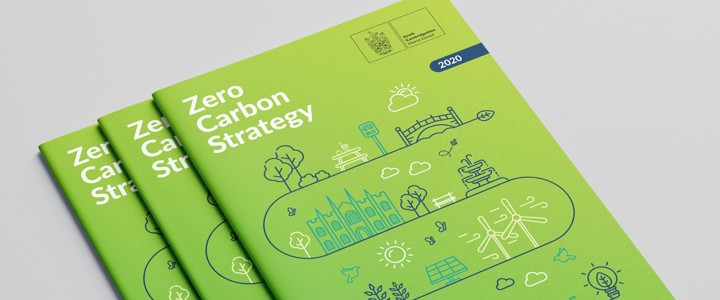
As a Council, we declared a climate emergency in November 2019, and an ecological emergency in July 2019. We are responding to the immediacy of these crises in changes to how we deliver services that benefit residents, businesses, and Parish Councils.
Since 2018, being Green to our Core has been a top Business Plan Priority, delivered on through our approach to reducing emissions through mitigation, adaptation, and natural solutions across all areas of our influence. This has been reflected in the creation of our dedicated Climate and Environment team, which now consists of 5 members of staff to lead the area. Our Climate and Environment Advisory Committee is chaired by Cllr Pippa Heylings, who is also a Board Member on the Local Nature Partnership, as well as the Lead on the LGA’s national cross-party Climate Change Task Group. This group puts climate change at the top of the national agenda for all councils in England and Wales. Leader, Cllr Bridget Smith, is our Climate Lead and holds the role of Environment and Climate Lead at the Cambridgeshire and Peterborough Combined Authority, which set up an Independent Commission on Climate. We are active partners in delivering the recommendations of the Commission along with Cambridgeshire County Council and Cambridge City Council.
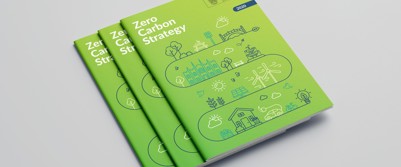
We adopted our first Zero Carbon Strategy in May 2020. This sets out the need to halve net carbon emissions in the district by at least 2030 if not before, and our plans to support this. In February 2021 we created our 'Doubling Nature' strategy [PDF, 3MB], sister document to our Zero Carbon Strategy, setting out our approach to increasing wildlife-rich habitats, tree canopy, and access to green spaces in South Cambridgeshire.
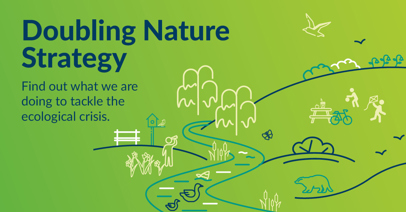
These strategies recognise that our influence is greatest in terms of planning. We have made advances as a Council, changing our approach to developing our new Local Plan, putting climate and biodiversity at the forefront, whilst ensuring that future residents will also experience place and wellbeing benefits from this. The development our Local Plan, now in its draft stages has involved commissioning a pioneering tool to examine the likely impact of carbon emissions from different spatial strategies. This informed the preferred development strategy set out in the Greater Cambridge Local Plan First Proposals which will require all new homes and non-residential buildings to be Net Zero for the energy used, location and design to promote sustainable travel. The study also includes a critical examination of the potential role of offsetting, integrated with the Green Infrastructure evidence base. Our integrated Action Plan, which serves both strategies guides our actions in our drive to help mitigate, adapt to, and provide natural solutions in response to climate change, as well as increasing biodiversity.
This approach can be seen as we finalise a new Biodiversity Supplementary Planning Document, updated in line with changes to national guidance on biodiversity. Once adopted, this will provide up to date and clear guidance to developers on what they must do to better protect and enhance any local biodiversity affected by development.
What are we doing on our own estate?
Our rolling plan to make our existing Council houses Net Zero carbon is making homes more energy efficient and bringing down energy bills for tenants. This reflects the importance of tackling fuel poverty in the face of rising energy prices, to provide our residents with warm homes.
- Around 2,200 solar panel systems have been set up
- Approximately 270 air source heat pumps have been installed
- 850 homes have been improved with external wall insulation
We continue to seek to reduce our emissions across our housing. Our partnership with the Net Zero Collective, involves a project to monitor the effectiveness of energy efficiency improvements against property archetypes. Through this project we hope to deliver meaningful impact to our residents whilst reducing energy costs as well as carbon emissions.
Our project to upgrade our 1,800 streetlights across South Cambridgeshire is almost complete. We are replacing existing bulbs with low energy ones to reduce light pollution, improve lighting and cut energy bills.
Nearly 2/3 of our emissions come from our fleet, so our longer-term plan involves transitioning all our diesel vehicles to electric and alternative fuel. We have the county’s first electric bin lorry, plus 2 more have been ordered and will be in service within the next few months. We also have several electric vans for use by colleagues working out in the district. £2.7 million will be made available from the Combined Authority to develop a solar farm to power electric bin lorries used by Greater Cambridge Shared Waste, so long as additional checks such as value for money assurances are passed. Our shared waste depot in Waterbeach is already partly powered by solar panels.
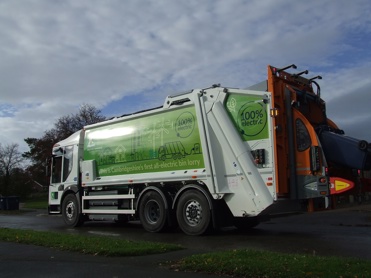
In February 2020, South Cambs District Council approved an extensive project to retrofit our main Cambourne Office, to reduce energy bills and carbon emissions for the building. These improvements on our main building are essential to achieve our aim of being a zero-carbon district by 2050.
After the disruption of the pandemic, the project is reaching completion. The solar carport (a car park with EV chargers for staff and visitors, shaded by solar panels) is now in use and all lights in the building have been replaced with energy-saving LEDs. To decarbonize the building's heating system, several boreholes have been drilled to facilitate a Ground Source Heat Pump, which is expected to decrease the building’s gas consumption by a minimum of 79%.
The project was financed using our ‘renewables reserve’, a fund accumulated from business rates paid in relation to renewable energy sites (for example, solar farms) in the District, and will pay for itself in under 20 years of operation.
- This will almost halve the building's carbon emissions during the first year following completion
- By 2030 the building's emissions should drop to a quarter of current levels, and by 2050 to 10% of 2019 levels
- This project plays a significant role in the reduction of our carbon footprint
The investments we are making to deliver our Zero Carbon strategy are funded by business rates on commercial renewable energy developments such as solar farms.
We have changed our procurement process to incorporate the principle of lifecycle stewardship into our practices. When we procure goods or services, a member of staff must conduct a sustainable procurement assessment, and businesses must show that they have a plan to reduce their emissions.
For our 2024/25 Budget Process we have incorporated a climate and biodiversity impact assessment for bids and savings over £20,000. Where a proposal is not supported by a returned assessment, it will not be accepted.
We are developing a series of resources for staff in a toolkit. As part of this, we have delivered training to Refuse Drivers, and have designed a handbook for members of staff to let them know what they can do at work and at home to address the climate emergency. Through this, we equip our officers with the tools to tackle climate change in every part of our operations.
We have also been certified as a Bronze Carbon Literate Organisation by the national charity, The Carbon Literacy Trust.
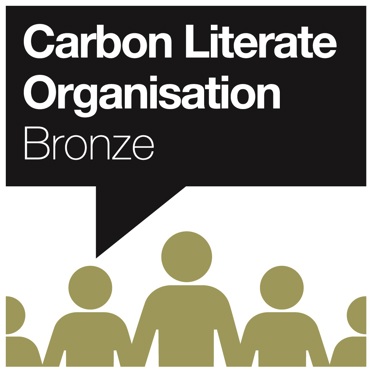
The certification is a signal that the Council is now even better placed to consider climate impacts of delivering services and supporting residents. Certification has been achieved by delivering Carbon Literacy training to staff at a variety of levels, including the most senior/decision-making members of staff.
The training is designed to help staff to act on climate change within their roles and empower them to consider projects which could reduce emissions both within the Council and wider district.
How are we using our influence in the wider district?
Following on from the success of our 3 Free Trees scheme in 2020, in 2021 we offered 6 free trees to every Parish Council that signs up.
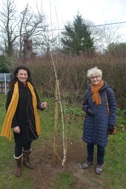
- In 2020, 54 parishes accepted 3 trees; that's 162 trees planted
- In 2021, a further 227 trees were planted around the district
- In 2022, parishes were given the choice between 6 smaller trees (whips) or 1 larger, more established tree. 144 trees were planted
- The scheme will be launching again in 2023
Since launching in 2019, over £500,000 has been allocated to 71 different community groups through our Zero Carbon Communities Grant. Projects support communities with cycling, tree planting, energy efficient lighting, food production, distribution, and waste reduction. One recipient, Cambridge Carbon Footprint, has run a training programme called Net Zero Now, which has been empowering community leaders to take climate action, resulting in one parish council declaring a climate emergency.
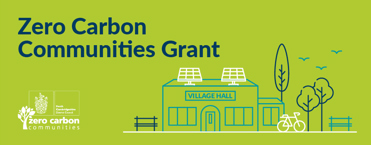
As well as this we are involved in several schemes to help reduce both emissions and costs for householders. Through the ECOFlex scheme, we have provided 204 declarations for homes to receive energy efficiency measures. We are working with neighbouring local authorities to develop a home retrofit service, Action on Energy Cambridgeshire. As well as installing free insulation and other energy improvements for lower income households funded through government schemes, it will provide a trusted route to retrofit for the willing and able to pay.
In partnership with Cambridgeshire County Council, we delivered the Solar Together Cambridgeshire scheme, which has installed 1.93 megawatts (MW) of Solar Photovoltaic (PV) panels in homes across the district. In 2021 we helped 2,144 people register their interest in the Solar Together Cambridgeshire scheme. This number represented about 42% of all registrations across the whole of Cambridgeshire for the duration of the scheme in 2021. The scheme ran again in 2022 and 535 households installed solar PV, representing a further 2.3 MW of capacity. Once again, South Cambridgeshire’s share of installations was the highest of all districts.
We offer a grant of up to £5,000 to install Electric Vehicle Chargers at village halls and community buildings, which has so far helped fund chargers at four rural locations in the district.
We continue to engage residents, businesses, community groups and Parish Councils throughout the district. Our quarterly newsletter reaches 603 individuals and gives advice on what people can do in response to the climate emergency and shares environmental news, events, and schemes available. Our website provides a Climate emergency toolkit to residents to give them ideas on what they can do to reduce their emissions.
We run quarterly sessions to share inspiration and ideas, so far over 150 members of the public have been engaged through 5 sessions. We’ve previously run a fortnight of Climate and Environment events whereby we can celebrate climate action taking place in the district, as well as sharing what we as a Council are doing to support this. In 2021, these events attracted 707 individuals, and a further 1,872 viewed the videos subsequently online.
In 2023, we hosted a Local Action Climate Conference for parish councils and community groups, to share knowledge and celebrate the progress made by groups taking action on climate change at a local level. The Conference was chaired by Cllr Brian Milnes (Lead Cabinet Member for Climate and Environment) and featured guest speakers on subjects including community energy projects, local nature recovery and public EV charging.
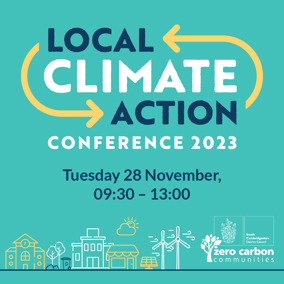
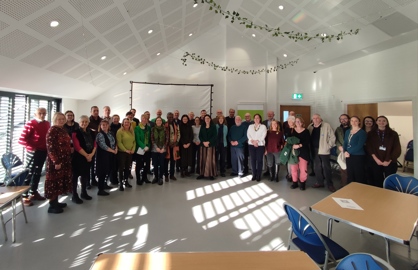
During COP26 in late 2021, we encouraged local people, including schoolchildren, to submit their climate change questions to us. We then put these questions to our local climate change experts. You can watch the questions and answers video for more details.
Our actions have been recognised widely by the Local Government Association; we have been featured in 3 case studies since August 2021 for our work on Climate, Environment and Waste. These have been for our Zero Carbon Strategy, our Zero Carbon Communities Grant Scheme and our Greening of South Cambridgeshire Hall project. In 2021 our ‘Green to our Core’ work was awarded a certificate of excellence by the iESE Public Transformation Awards. We continue to strive to improve climate, environment and biodiversity in South Cambridgeshire.

